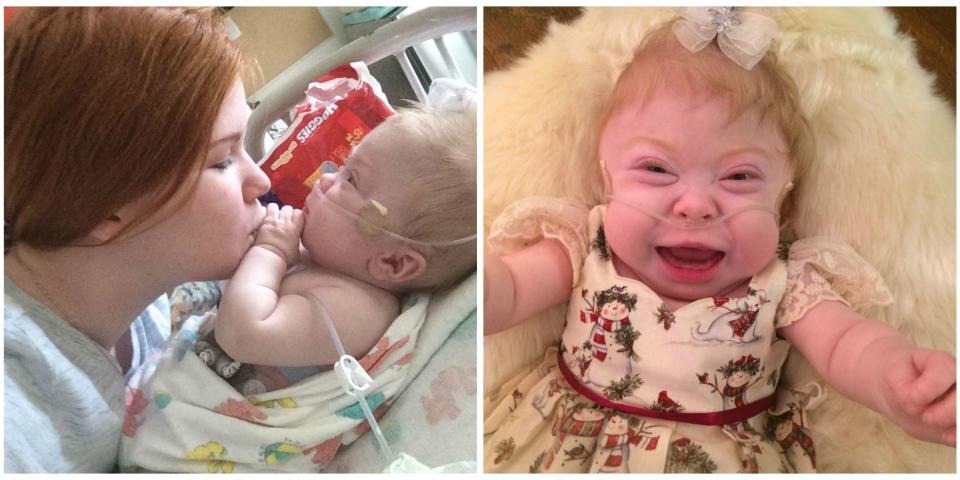Terminally-Ill Baby Saves Mom After Pregnancy Leads to Cervical Cancer Diagnosis

Last year, now-22-month-old Willow Rae Porter spent just 12 days outside of the hospital. After months of inconclusive testing, doctors discovered that the little girl suffers from inclusive-cell (i-cell) disease, a terminal condition that inhibits growth, breathing, heart function and digestion. She is one of 72 confirmed cases known in the world.
In medicine, Willow's condition makes her a devastating one-in-a-million statistic. To her mother, 23-year-old Katie Hanson, she is one-in-a-million in a different way - pregnancy ultrasounds led to Hanson's early cervical cancer diagnosis. Little Willow, as hard as she's had it, saved her mom's life before she was born. "Willow was my saving grace," Hanson, from Seattle, Washington, told Caters. "If I wasn't pregnant I would never have known I was developing cervical cancer."

Hanson was encouraged by doctors to terminate her pregnancy and begin treatment, but she couldn't fathom not meeting the little girl whose life gave her back her own. "Willow saved my life. I wasn't going to value myself over her, so after giving birth I had three inches of my cervix removed," Hanson explained.
Treatment worked - Hanson is currently cancer-free and has now dedicated her life to making what is left of Willow's beautiful. "Our main priority is to keep her comfortable and happy. Despite all the problems she is facing she is a very happy child," she said.
Willow's happiness is a testament to her strength - the problems she faces are extreme. In layman's terms, i-cell causes the enzymes that break down the body's fatty substances and complex carbohydrates to fail, which leads to build up in the joints, soft tissue, cartilage and bone. (For Willow, you can see this build up specifically in her gums.) On a more critical scale, the common cold can lead to a collapsed lung and life support. Heart, respiratory and kidney failure, neurological and developmental issues and severe hip dysplasia are the short-list of Willow's daily struggle. She has battled pneumonia a whopping eight times in her short life.

At 18-months, Willow stopped growing (another symptom of i-cell) - today, she weighs 17-pounds and measures 27-inches long, which makes her the size of a small seven-month-old. Limited physical growth hasn't inhibited her drive, though. She's mastered sign language for basic commands like "more" (she taps her hands together) and "binky, please!" (she touches the corner of her mouth). Despite the fact that most sufferers with her disorder are mute, she can say "Momma" and "yeah."
Treatment for i-cell is limited - the condition's rarity means that most funding for research comes from affected families, of which there are few. With no cure in sight, Hanson and her family are doing their best to keep Willow "alive and comfortable," she said. "There's no plan set out for i-cell kids other than making the most of the time you have with them," Hanson explained. "Despite this, children with i-cell are angels on earth, my little girl puts up with so much and doesn't bat an eyelid. Willow is adorable and a social butterfly, she loves watching people, talking to people and always has a smile ready for anybody."
If you'd like to contribute to Willow's care, you can do so on the family's YouCaring page.
[h/t Caters]
You Might Also Like

